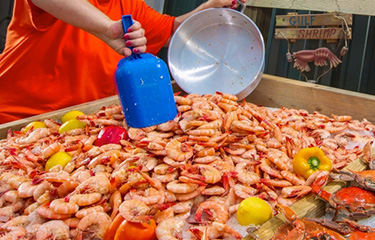Restaurants in the U.S. state of Louisiana are flouting a state law requiring them to indicate on their menus whether the shrimp or crawfish they’re selling is imported, but the state has yet to impose any fines on violators.
Health inspectors have issued 2,671 citations for violations of the 2019 Louisiana law, according to an investigation by the Louisiana Illuminator. However, the state law does not include any provisions about penalties, leaving the state health department toothless in trying to enforce it.
Adopted in 2019, the law is an attempt to discourage restaurants from serving imported seafood over local products. Shrimp and crawfish remain two of Louisiana’s biggest seafood products, but the local industry faces steep competition from cheaper imported shellfish. By requiring restaurants to highlight the country of origin of imported shrimp on their menus, lawmakers hoped to shame them into switching to local alternatives.
Within a month of the law going into effect, inspectors had issued more than 100 citations.
Louisiana’s state and federal lawmakers have worked to protect the domestic industry, which has shrunk significantly in the face of subsidized international competition. Still, the seafood industry generated USD 2.47 billion (EUR 2.27 billion) in economic activity in 2021, according to the Public Affairs Research Council for Louisiana, accounting for one in every 70 jobs in the state. Shrimp and crawfish alone represent USD 220 million (EUR 201 million). Louisiana produces more than 90 percent of U.S. crawfish and around 30 percent of domestically caught shrimp.
U.S. Representatives and industry groups were able to convince the International Trade Commission earlier this month to extend antidumping duties on shrimp imports from China, India, Thailand, and Vietnam which were first put in place in 2005.
“Decades of increasing imported shrimp volumes have created a race to the bottom on prices and decimated our market share,” ASPA President Trey Pearson said in response. “The ITC provided us with a lifeline and incentive to continue the fight to allow this industry to survive in a fair competitive environment.”
Domestic shrimpers have also faced local challenges, with hurricanes costing the state seafood industry USD 570 million (EUR 522.7 million) in 2020 and 2021, according to a study from the Louisiana State University Agricultural Center and the Louisiana Department of Wildlife and Fisheries.
This week, NOAA Fisheries declared a fishery disaster for Louisiana’s saltwater finfish, oyster, and shrimp fisheries in the aftermath of Hurricane Laura, clearing a path for federal financial relief to the industry. The state has asked NOAA Fisheries to declare a disaster for Hurricane Ida in 2021, which officials claim wiped out 30 percent of the shrimp boat fleet.
Photo courtesy of Shutterstock/Cavan-Images







